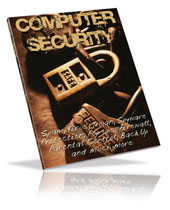|
| |||
How Best to Combat Spyware?
Spyware can be more than an annoyance. Poorly programmed spyware can interfere with other programs and can even cause system instability. Privacy issues are at stake as well. This type of software is often installed without a user's consent and often can't be uninstalled without special tools. When distributors use tricks and deception to install uninvited software, trust is destroyed. The first line of defense against spyware is to be careful installing software. Know what's being downloaded. A large percentage of freeware or shareware programs have spyware embedded in them. Sometimes that's disclosed in the user agreement, but often not. Before downloading any new software, look for guarantees
that it's spyware free. Even so, be on your guard — the file-sharing program
Kazaa has been claiming to be spyware-free for years. Anyone who installs this
software soon has an opportunity to test this claim. If you find your system bogged down with spyware, don't give up hope. There are several utilities specifically designed for removing spyware from your computer. They rely on frequently updated databases which contain signature files of all known spyware and adware. They scan all the files on your hard drive and alert you if 'uninvited guests' are found. Many are free, though sometimes the paid versions have more automation features such as removing spyware on receipt rather than requiring a manual scan. None will find every piece of spyware on your system, since they rely on a database which has to be populated according to someone's judgment. And, one man's spyware is sometimes another's welcomed advertiser. Some spyware is notoriously difficult to remove. They may make several alterations to your system settings and install files in different places. Often the only way to remove this type of spyware is to find the locations of all the files and manually delete them. Needless to say, this should be performed only by skilled users. Deleting the wrong files can damage your programs and even your operating system. One software tool that can help you remove difficult spyware is called 'HijackThis'. It creates a list of files which could have been altered with spyware. The list is very comprehensive and also includes system files and files installed by legitimate software, so take care. HijackThis wasn't designed to be a spyware removal tool, but it can be used to locate persistent and hard to remove spyware. It requires knowledge of various system settings and you must be careful when changing them. It's possible to disable your system with the wrong setting. Fortunately, there's a community of HijackThis experts on the Internet willing to give free advice about suspicious entries. Once your system is spyware free — help keep it that way. Some of the spyware removal tools include utilities that can protect your computer from being exposed to spyware. Much like virus scanners, they monitor changes to your system files and alert you of any suspicious activity. And, of course, beware those tempting looking free offers. You may get more than you bargained for.
|
What is a Computer Virus Anyway? Are Browsers, your Key to Security? How do you combat Viruses, Beyond the PC?
| ||
Guide To Computer Security Related eBooksSpyware, Viruses, Adware And Scams! Do You Know How To Protect Yourself?by Jayen Woods Are you new to the World Wide Web? If so there are a number of things you should be aware of. Even if you have spent just a small period of time on the web, you will probable have come to realise the sheer amount of free information, great services and opportunity that the web has to offer. But if you are a novice I must warn you...Continue Reading!
|  | ||
Guide To Computer Security Related ArticlesSome Common Internet Security Terms Explained!By David Cann Spam: Spam is the general name for unsolicited electronic messages. It is most commonly seen as email but also occurs in almost all other digital formats including SMS, blogs and instant messaging. The term ‘spam’ is generally thought to have originated from a Monty Python Sketch where almost every...Continue Reading! (two or three lines of text) (with ...Continue Reading... link inserted at end of the paragraph)
| |||
